Dear Friends,
Welcome to June’s Substack.
I hope you’ll enjoy this month’s blog Devastation & Destruction or Resilience, Reimagining and Rebuilding? written after a trip to Honduras with CARE. The audio version is available by clicking the link in the blog or clicking the link here for all podcasts. https://joanneleedomackerman.substack.com/podcast
Book News announces an award received for The Far Side of the Desert and the recent paperback publication of the novel, along with events, podcasts, and radio interviews. I’ll be in New York City on a panel at ThrillerFest in June so if you’re there, I’d love to see you.
The Writers at Risk section focuses on the case of Egyptian writer Alaa Abd el-Fattah.
The Books to Check Out section profiles nonfiction book The Vory: Russia’s Super Mafia by Mark Galeotti and Anna Pitoniak’s novel The Helsinki Affair, a complex thriller of characters, set in the territory of Russian superspies, CIA and crime.
In the Scene section you’ll find a photo, along with text from The Far Side of the Desert, and in Words of the Month a couple of words you may not use but might like to know, including this year’s winning word from the National Spelling Bee.
I look forward to meeting new and current readers at events and online. Even if you’ve read the hardcover of The Far Side of the Desert, I hope you’ll share the paperback with friends. Thank you to everyone who’s come to bookstores, libraries, book clubs and online for my latest novels Burning Distance and The Far Side of the Desert.
If you’re interested in having me speak at a venue or with a book club, click here. Thank you too for reading and sharing this free monthly Substack On the Yellow Brick Road. I hope you’ll stay in touch!
Devastation & Destruction or Resilience, Reimagining and Rebuilding?
The young woman next to me sat silently at the table for the first hour of presentations and discussion. She was younger than the other women, with long dark hair, frailer than the more robust women around the table. Her slender fingers touched tentatively the papers in front of her.
I was in Honduras with CARE, the humanitarian and development non-governmental organization (NGO) which has worked in Honduras for 70 years.
The women at the table were sharing their stories of the violence they had suffered and the way they came back from the brink, a precipice that caused several of them, including the woman next to me, to contemplate suicide. The only other possibility they saw to survive was to migrate to a safer place like the United States. Most had children and had resigned to taking their children with them. The violence against them was domestic and also from the gangs that surrounded their community. Police told them they couldn’t get help when they were threatened, only when they were actually harmed, and even then, very few perpetrators were prosecuted. Impunity prevailed. Doctors told them not to clear away the blood from their faces when they were beaten; otherwise, they had no evidence.
They didn’t want to leave. Honduras was their country and home, but alone, they didn’t know how they could survive. Honduras has one of the highest murder rates against women in the world. Several concluded if they didn’t leave, they would be killed and so they left with their children. But the escape was equally dangerous. Several had been raped again or kidnapped, and some of their children were also abused or died on the journey.
Finally, the woman beside me spoke up. She was 29 though looked younger. She had a 6-year-old son and was one of these women described. She appeared frail, but as she recounted her attempt to find safety and a life for herself and her son, her quiet voice gained confidence and volume. By the end of the story of her perilous journey and her progress, many of us listening thought she could run for community office because of her courage and quiet charisma, though of course politics could be a perilous journey of another kind.
Like many of the women around the table, she found a safer place, developed a business of her own and some protection and resources for herself and her son. This came from the community of women in a Women’s Network, aided significantly by funds from the U.S. government—USAID—with CARE and the local organization CASM developing and implementing the “Women Weaving Free Lives from Violence” program that serves 112 communities and approximately 32,000 people.
However, the recent shutting down of U.S. foreign assistance with the large reduction of USAID, has meant this program has had to cut back significantly, and other programs have had to shut down entirely. CARE through its own Triage Fund continues to work with these communities but on a much more limited basis. “Seeding Hope,” a program offering leadership training, small business support and safe spaces for at risk youth who have faced violence, displacement and also uprooting because of hurricanes has been canceled entirely.
Many of the women in this region have worked in textile factories making clothes and items which ship back to the U.S., including MAGA caps and swag. But many of these factories have now closed.
A program “Nourishing the Future” has worked for years with small-scale farmers through Farmer Field and Business Schools equipping farmers with training in the best agricultural and business practices. With this training farmers have significantly increased their income and also been able to practice “climate-smart” agriculture such as using a biodigester apparatus that transforms animal waste into useable fuel and saves on burning firewood. The programs have also been supported by the Cargill Foundation so can continue but have had to reduce in size.
These programs with farmers and with women have enabled community-led savings groups (VSLAs) which provide access to some capital and increase the income and stability for communities which in the past could not get credit.
“If you don’t get trained, you don’t get out of poverty,” said one farmer.
“Education gives us an opportunity to have a better life,” added another.
“We needed a way to make a living,” said one woman.
“We needed entrepreneurship workshops,” added another.
“You can’t do things by yourself; you need someone to walk with you.”
On returning from Honduras, I am left with the voices of the women and youth and farmers whom we met, with Ely who started a small food stand with $40 and after training now has a popular restaurant where we had lunch and where her supportive husband works for her. All express appreciation for assistance received and have a determination to take what they have learned forward and share it with their communities. But they also express a deep regret that the United States government can no longer be counted on as a robust partner in the development of their country whose GDP per citizen in 2024 was $3446. The 2024 per capita GDP for U.S. citizens was $85,784.
I’m honored that The Far Side of the Desert (Oceanview Publishing) was recently awarded the 2025 Bronze medal in the Suspense/Thriller category from the Independent Publishers Association (IPPY) Book Awards. Published in 2024, The Far Side of the Desert was also released in paperback April, 2025. I hope you’ll order, read and enjoy. If you’ve already read the hardcover, I hope you’ll buy the paperback and give to friends!
“The Far Side of the Desert is a riveting thriller with richly nuanced characters and fast-paced action. The plot imaginatively taps into recent history to illustrate the human dimensions of terrorism—both the complex psyche of the perpetrators and the gnawing questions among those sucked into their vortex. I binged until the end.”
—Robin Wright, author of Rock the Casbah: Rage and Rebellion across the Islamic World
Upcoming Interviews, Podcasts and Events:
Saturday, June 21, 2025, 8:00am-8:50am
Panel Discussion: "TRANSFORMATION, ADVENTURE, OR UPHILL BATTLE? Crafting Thriller Plots"
Thrillerfest
The Regent Room, 2nd Floor
New York Hilton, Midtown
1335 6th Ave
New York, NY 10019
Burning Distance (Oceanview Publishing, 2023 and paperback in 2024) was honored by the 2024 American Book Fest International Book Awards as a Finalist in the Best Mystery/Suspense and Thriller/Adventure categories.
“Burning Distance is a double helix of a book, carefully plotted and beautifully told. It’s a spy story interwoven with a love story, and the strands fit together in a way that moves the reader effortlessly from chapter to chapter. While fiction, its narrative of the CIA and the Middle East arms trade are very close to fact. Joanne Leedom-Ackerman observes the world of American spies and Arab fixers through the eyes of a young woman who keeps asking questions about her mysterious past until she gets all the revelatory answers. A subtle and satisfying novel.”
—David Ignatius, author of The Director, The Phantom Orbit, New York Times best-selling author, Washington Post columnist and novelist
I was glad to be part of the Authors for LA Auction which has raised funds for the Red Cross in support of writers and others in the Los Angeles fires. Funds are still needed and a list of where you can donated is at the end of the blog in my February 2025 Substack.
Thank you to all who have come together and shared readings and conversations around my novels in 2024.
Selected recordings of past events and interviews:
Strategies for Living Podcast: Finding Resilience Through Story
Interview with Janeane Bernstein on NPR’s KUCI, Get the Funk Out!
Book Launch for Akram Aylisli's People and Trees with Plamen Press
Why Baldwin Matters Series, The Alan Cheuse International Writers Center
Malaprop’s Bookstore and Café in Asheville, NC
Kinokuniya Bookstore in New York City with Salil Tripathi
Baum on Books on WSHU Public Radio
Interview with Anna Roins of Authorlink
Interview with Deborah Kalb
For more podcasts, videos and interviews, click here
Alaa Abd el-Fattah (Egypt)
(Sources include PEN International, English PEN, American PEN, World Organization Against Torture, Amnesty International)
Alaa Abd el-Fattah, a British and Egyptian citizen, has spent over a decade in and out of Egyptian prison for his writing and nonviolent activism in support of a more democratic government. His current 5-year sentence was supposed to expire in September 2024, but he remains incarcerated with the explanation that his two years in pre-trial detention didn’t count towards his sentence.
Notably, he and his mother Laila Soueif, a women’s and human rights activist and mathematics professor, are both now on hunger strike in protest. After more than 100 days both are facing life-threatening conditions.
In spite of global protests regarding his case, in particular from the British government, the Egyptian authorities have continued his incarceration. He has been subjected to torture and held in harsh conditions. He has been denied consular visits and access to a lawyer and to the health care he needs. He has also been denied access to books, newspapers and notebooks so he can write.
An author, blogger and software developer, Alaa is renowned for his role in the Arab Spring with his use of technology and his work developing Arabic-language versions of key software and platforms and his documentation of human rights abuses. His book You Have Not Yet Been Defeated (Seven Stories Press) received acclaim and won the 2022 Electronic Frontier Foundation Award for Democratic Reform Advocacy and PEN Canada’s One Humanity Award in 2023. He was named the 2024 Writer of Courage by English PEN’s Pinter Prize winner Arundhati Roy.
Born in Cairo to a British-Egyptian mother and Egyptian father, he grew up in a family of activists. His father was a human rights attorney, and sisters Mona Seif and Sanaa Seif co-founded an independent newspaper during the Arab Spring.
“We are deeply concerned for Alaa’s health and well-being in prison as he continues his hunger strike. We are all shocked to see the toll it has had on his mother, Laila, who has been previously hospitalized for her own ongoing hunger strike, and we are terrified to think about Alaa’s condition in detention while the Egyptian government continues to deny him access to a lawyer and UK consular visits. Neither Alaa nor Laila should have to put their lives at risk to secure his fundamental right to freedom and human dignity. The UK should ensure his reunification with his family immediately,” said Burhan Sönmez, President of PEN International.
To Take Action for Alaa Abd El-Fattah:
Urge the Egyptian authorities to release Alaa Abd El-Fattah immediately and unconditionally, having fully served his prison sentence.
Send Appeals to:
President
Abdel Fattah al-Sisi,
Office of the President,
Al Ittihadia Palace,
Cairo, Arab Republic of Egypt,
Fax: +202 2 391 1441
Email: p.spokesman@op.gov.eg
Moh_moussa@op.gov.eg
Salutation: Your Excellency
X: @AlsisiOfficial
Minister of Justice
Counselor Adnan Al-Fangari
Ministry of Justice,
Lazoghly Sq.,
Fax: +202 2 795 8103
Email: mjustice@moj.gov.eg
Salutation: Dear Minister
Please send your letters via the Embassy of the Egypt in your country. Addresses could be found here.
Spread the word about Alaa Abd El-Fattah’s case on social media. Use the hashtags #FreeAlaa and #ImprisonedWriter, tagging:
@pen_int, @Pen_mena, @alaa, @FreedomForAlaa (X), @peninternational (Instagram), and facebook.com/peninternational and facebook.com/penintmena (Facebook).
Please also tag @FCDOGovUK and @AlsisiOfficial (X)
An attack on a writer, the shutting down of a publishing house, the torching of a newspaper reduce the space in the world where ideas can flow. Freedom of expression is vital to writers and to readers but is challenged daily around the world. Listed here are organizations whose work on human rights and in particular issues of freedom of expression I’ve been engaged with directly and indirectly over the years. Some of the organizations have broader agendas, but all have contributed to keeping space open for the individual voice.
PEN International (with its 147 centers in over 100 countries)
PEN American Center
English PEN
PEN/Faulkner Foundation
Human Rights Watch
Amnesty International
Amnesty International USA
International Freedom of Expression Exchange (IFEX)
Committee to Protect Journalists (CPJ)
Article 19
Index on Censorship
Poets and Writers
Authors Guild
International Center for Journalists
Those writing political thrillers often depend on the scrupulous research of their nonfiction colleagues. The novel is a work of imagination, but writer and reader rely on facts as context. The novelist does the research, including reading those who have done even more research. The best fiction takes the reader into the hearts and minds of the characters, explores behind the scenes of characters who are often making decisions with global consequences.
This month’s Books to Check Out includes a well-regarded nonfiction book The Vory: Russia’s Super Mafia by Mark Galeotti about the rise of the Russian criminal world that has also seeped into the American landscape and a novel The Helsinki Affair by Anna Pitoniak which tells a story of father and daughter in the CIA and the influence that has crept into their mutual work, both professionally and personally. Characters drive the story, but the factual context is crucial.
I don’t know if Pitoniak is familiar with Galeotti’s book, and the story of the Vory doesn’t play into the world Pitoniak creates, but the two books inhabit some shared spaces and knowing each enriches.
The Vory: Russia’s Super Mafia by Mark Galeotti takes the reader on the journey of the Russian Mafia from the gulags and prison labor camps in Siberia to the streets of Moscow and New York. The Vory—meaning “thieves”—documents the rise of Russia’s criminal networks, the culmination of which are the oligarchs which emerged after the fall of the Soviet Union when politicians and criminals formed an uneasy partnership.
While many in the West heralded the fall of the Soviet Union and anticipated a road to more universal freedom and democracy, the criminal networks in Russia saw the opportunity of more freedom of movement for their enterprises globally.
After the Soviet defeat in Afghanistan, many Russian soldiers came home to little. Combining the disaffected veterans with the hardened mafia figures from the gulags, the Vory grew in influence and power, eventually reaching into the very corridors of power in Russia and expanding to U.S. shores.
Mark Galeotti narrates these stories with narrative flair along with documented evidence and presents memorable characters in this decades-long saga.
From The Vory:
In 1974, a naked body washed up on the coast at Strelna, to the south-west of Leningrad (as St Petersburg was then known). It was not a pretty sight, having been floating in the Gulf of Finland for a couple of weeks. This body may not have been contending with land’s issues of bacteria and insect ravages, but the denizens of the sea had snacked gleefully on the corpse, especially its eyes, lips and extremities. A series of deep knife wounds in the man’s abdomen represented a fairly good indicator of the cause of death. Yet with no fingerprints, no clothing, and with his face bloated, battered on rocks and partly eaten away, there were none of the conventional clues to identify him. Checking dental records was a possibility, but this was before the true age of the computer and in any case most of his teeth were cheap metal replacements after a life apparently lived on the rough side. There had been no missing-persons notification filed for him. He didn’t even come from the Leningrad region.
Nonetheless, he was identified within just two days. The reason: his body was liberally adorned with tattoos.
The tattoos were the mark of a vor, the Russian word for ‘thief’, but a general term for a member of the Soviet underworld, the so-called ‘thieves’ world’ or vorovskoi mir, and life in the Gulag labour camp system. Most of the tattoos were still recognisable and an expert on ‘reading’ them was summoned; in this case, a former prison warder turned police investigator. Within an hour, they had been decoded. The leaping stag on his breast? That symbolised a term spent in one of the northern labour camps. They were known for their harsh regimes and thus survival was a mark of pride in the macho world of the professional criminal….
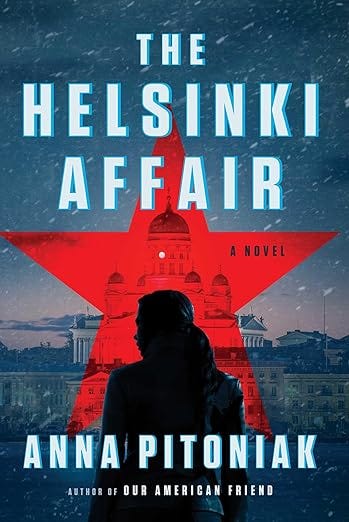
The Helsinki Affair by Anna Pitoniak balances two stories of espionage in two time periods with two betrayals resonating across the decades as secrets are slowly uncovered. Amanda Cole, CIA officer and daughter of Charlie Cole, also CIA, demonstrates early her fine-tuned instincts that aren’t listened to by her older male boss. He ends up failing to block the assassination of a U.S. Senator and loses his job as station chief. Amanda is assigned the position and becomes one of the youngest station chiefs in Helsinki.
As she searches for the cause of the assassination, she discovers incriminating documents that have her father’s name on one of them. Aided by a seasoned female CIA veteran Kath Frost, Amanda practices her spy craft to try to prevent a major arms trade at the same time she is digging into her family’s uncomfortable past.
The Helsinki Affair is espionage with intellect and heart, driven by events and especially by character.
From The Helsinki Affair:
It wasn’t exactly the sensible thing to do, standing outside in the hot noon sun in July in Rome. Semonov paced back and forth, mopping his brow, his handkerchief long since soaked with sweat. No, this wasn’t sensible. He ought to have done as the Romans did, escaping the summer heat by stopping at Giolitti for a cone of gelato, or napping in a shuttered bedroom, or fleeing the city altogether for the breezy hills of Umbria. But Konstantin Nikolaievich Semonov was not standing here, pleading to be admitted to the American embassy, insisting that he had urgent information to share, because he was an entirely sensible person.
In his glassed-in booth, the Marine hung up the phone. “You need to make an appointment. No one can see you today,” he said.
“Sir!” Semonov exclaimed, leaning toward the pinprick holes in the glass. “You are a Marine. I am speaking to you as a fellow military man. I am an officer in my nation’s army. My nation which is Russia.” A needless emphasis, as he had been required to slide his passport under the bulletproof glass barrier to identify himself. “You must understand. I have information that matters today. Not tomorrow not next week.”
Sharing here image and passage of text from The Far Side of the Desert:
“Gibraltar guards the mouth of the Mediterranean. It’s long been a launching point for invasions into Europe.”
“NATO stores ammunition inside the tunnels of the Rock,” Jim added.
(Over the years I’ve accumulated a running list of words I haven’t known from two main sources: WordDaily and WordGenius)
Éclaircissement
[ ey-kler-sees-mahn ]
Part of speech: noun
clarification; explanation.
Enlightenment.
Examples
"The professor's éclaircissement on the complex theory was helpful to the students."
"The book provided an éclaircissement on the author's intentions."
Shambolic
[ sham-bol-ik ]
Part of speech: adjective
1. very disorganized; messy or confused
Examples
“I’ve had a shambolic year, the worst ever.”
”Things are often a bit shambolic at the beginning of the school year.”
”Anna is far too shambolic to be able to run a business.”
I’ve spoken at bookstores, university classes, book luncheons and in-person and zoom book clubs and look forward to more ahead. I enjoy giving readings and addressing audiences in many venues and moderating discussions on a wide range of topics and most of all meeting readers.
Click here for a list of future and past public events.
Or fill out the speaking request form to schedule an event.
I like engaging with readers so if you are in a Reading Group or Book Club and read one of my books, I’m glad to be in touch by email, zoom, or when possible in person. I can also suggest discussion topics.
Fill out the reading group form here to schedule a meeting.







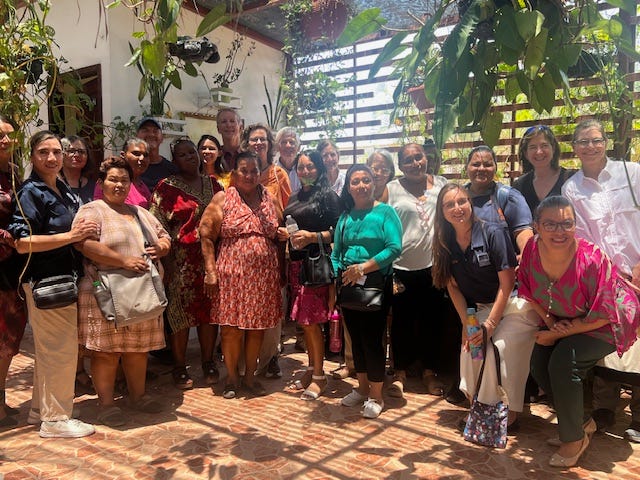
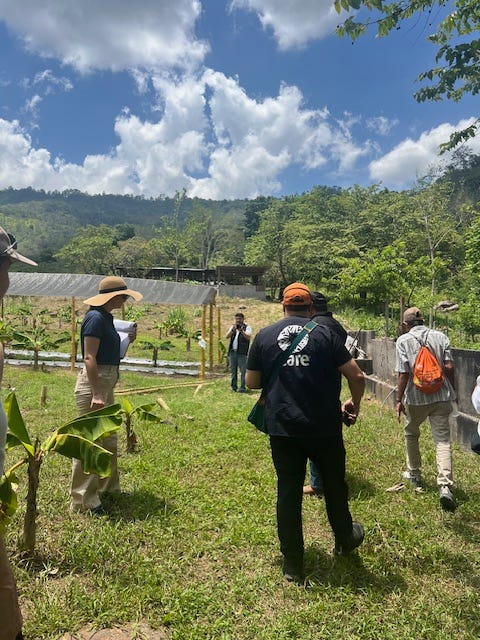



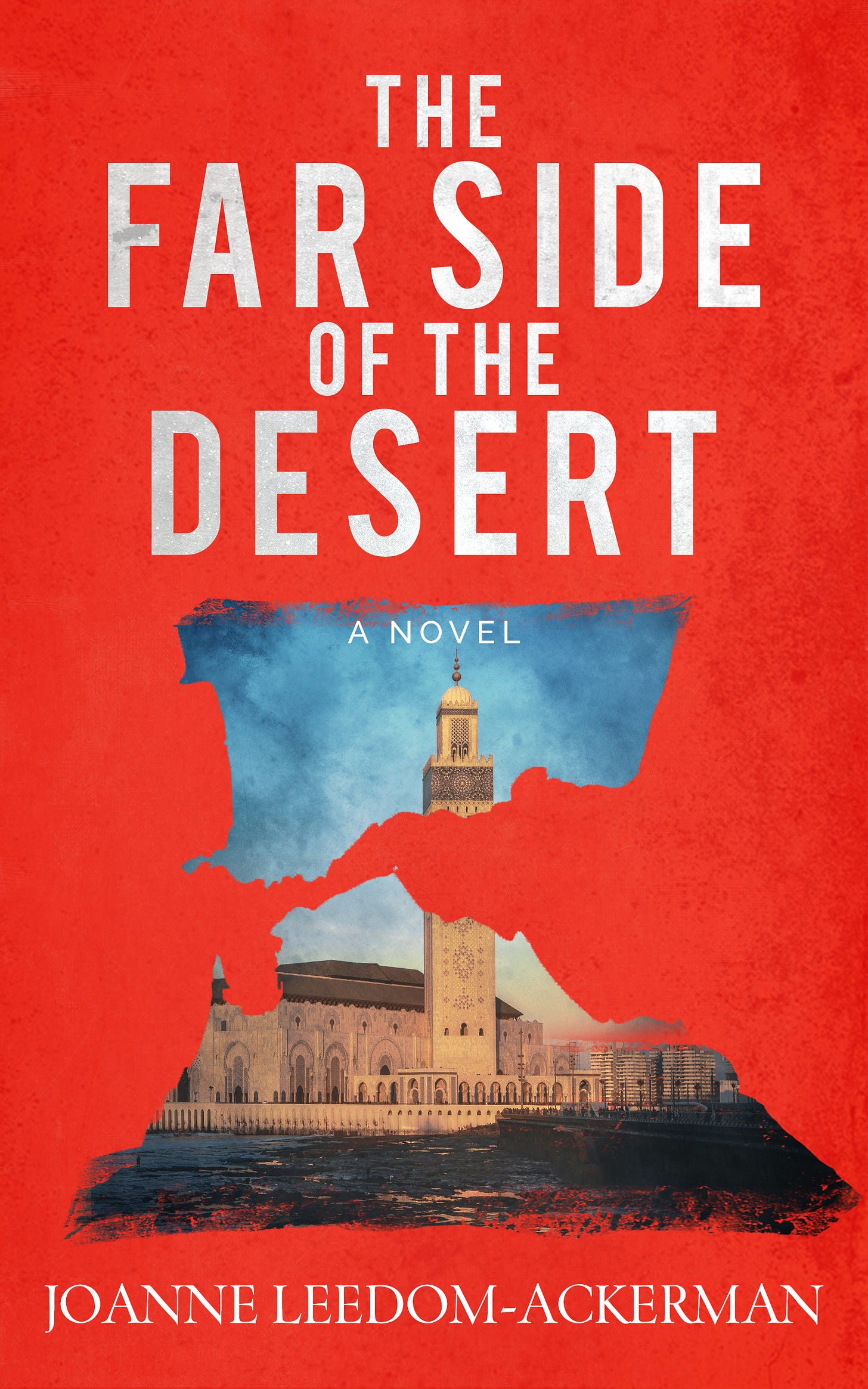


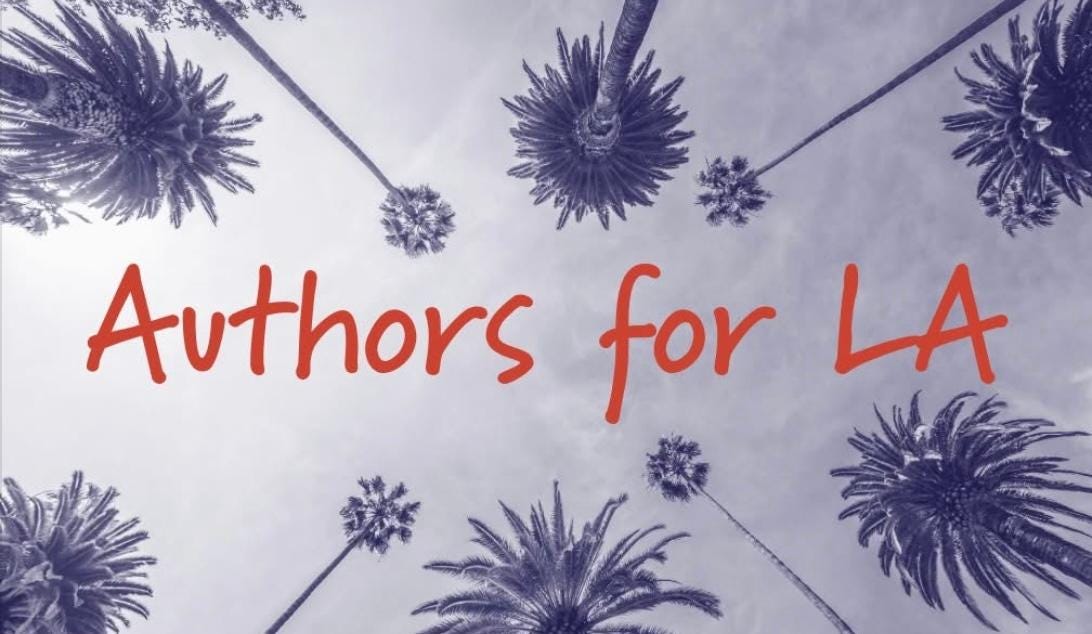

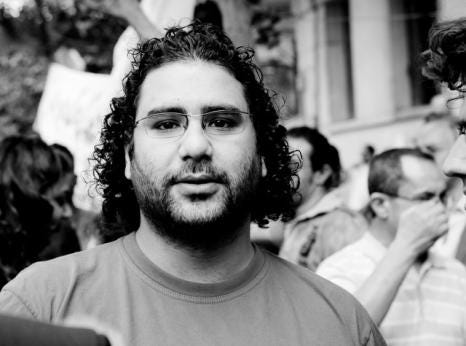


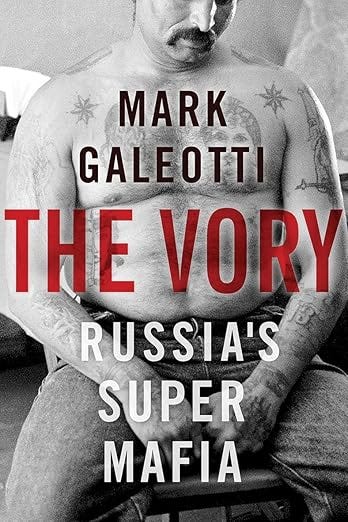

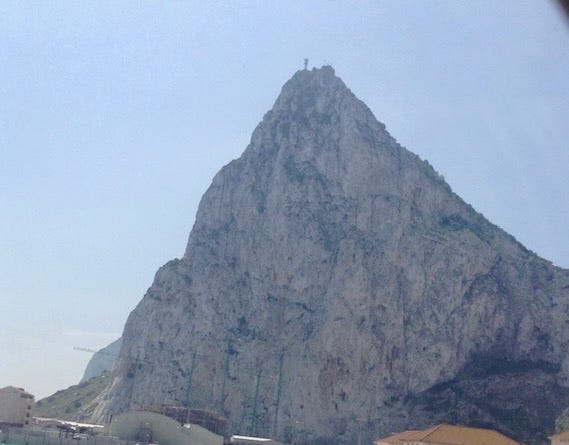


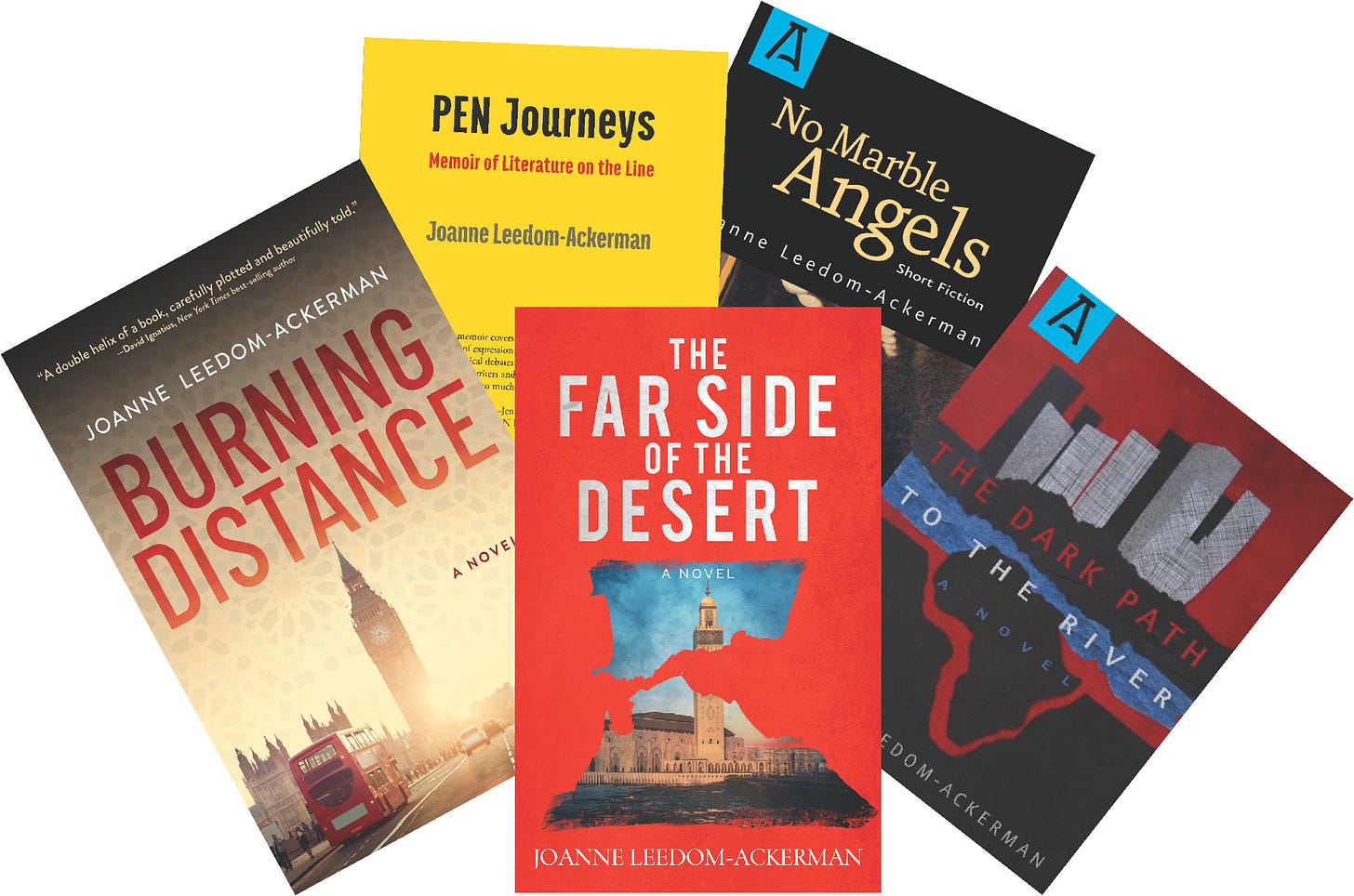
Joanne, thank you for your visit to Honduras.
I truly appreciate the way you're sharing the powerful stories of both suffering and hope from the women and communities you encountered during your trip. I hope many people have the chance to read your reflections and gain a deeper understanding of how critical aid can be for marginalized communities in Honduras—communities that dream of a better future in their own country, yet are often forced to migrate due to the combined impacts of violence, poverty, and climate change.
Historically, Honduras has depended on the United States for remittances, maquila industries, banana exports, and development aid. Yet, it has also contributed significantly to the U.S. economy and culture, generating value and enriching the country in many ways. I sincerly hope both societies keep strong ties and support in the near future.
Joanne, Thank you for your first person report on the role U.S. assistance has had in Honduras, especially for women and children...and the effect of the sudden cutbacks.